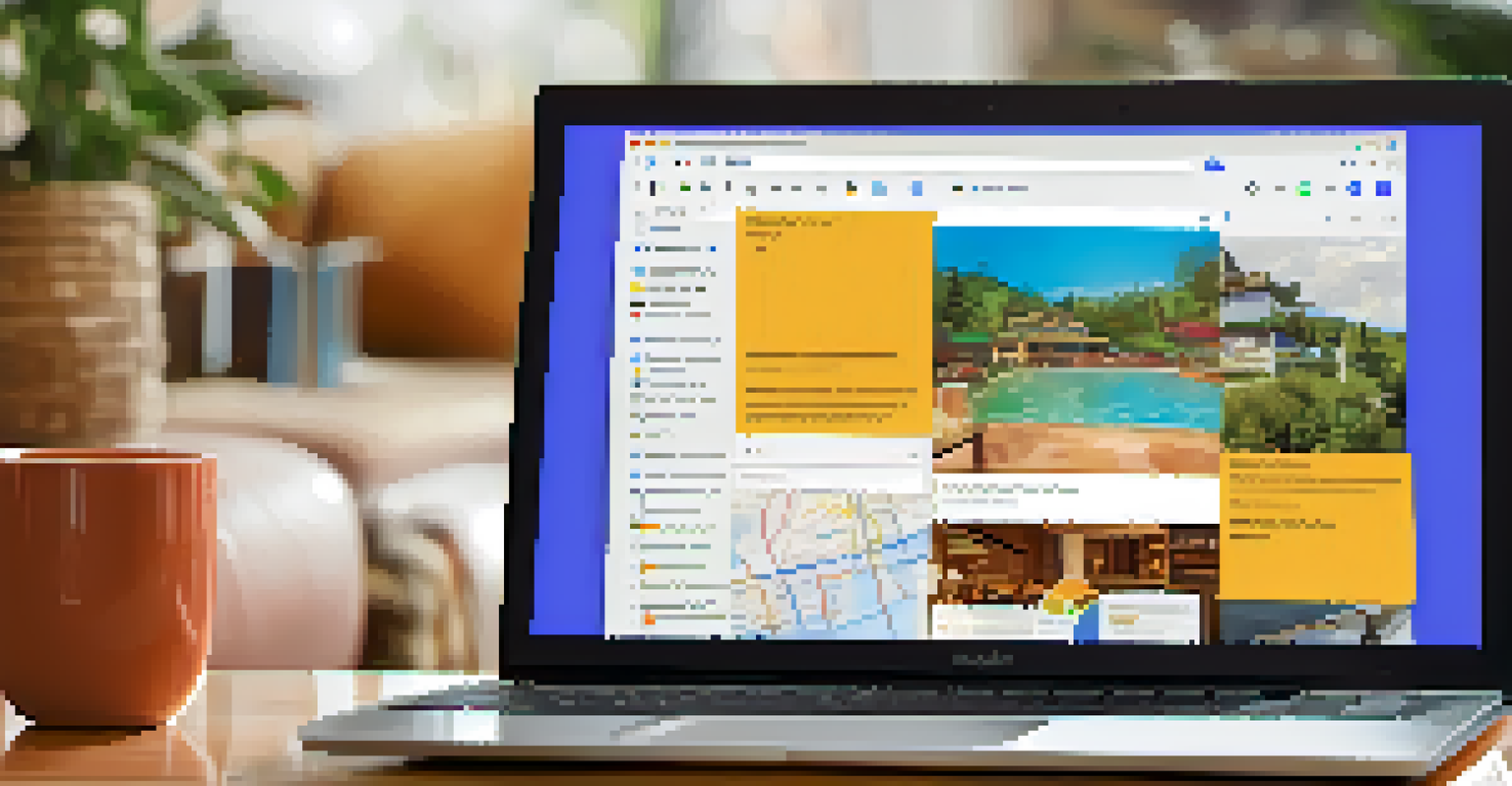Effective Communication Strategies for Group Travel Planning

Establish Clear Goals for Your Group Trip
Before diving into the details, it's crucial to establish what the group hopes to achieve with the trip. Are you aiming for relaxation, adventure, or cultural experiences? By clarifying these goals early on, everyone can stay aligned throughout the planning process.
The journey not the arrival matters.
Having a shared vision not only streamlines decision-making but also keeps motivation high. When members understand the group's objectives, they can contribute ideas and suggestions that align with those goals. This collaborative spirit can enhance the overall planning experience.
Consider drafting a simple mission statement for the trip. This can act as a reference point, helping to keep discussions focused and productive. Plus, it fosters a sense of ownership among all participants, encouraging active engagement.
Use Collaborative Tools for Seamless Planning
In today's digital age, leveraging technology can significantly enhance group travel planning. Tools like Google Docs, Trello, or dedicated travel planning apps allow everyone to contribute ideas and feedback in real time. This fosters a sense of teamwork and ensures that no one feels left out.

With collaborative tools, members can share important information, such as budget estimates, itineraries, and accommodation options. This transparency helps avoid misunderstandings and keeps everyone on the same page. It’s like having a virtual whiteboard where ideas can flow freely.
Set Clear Goals for Group Trips
Establishing shared objectives at the outset helps keep everyone aligned and engaged during the planning process.
Moreover, using these platforms allows for organized discussions, making it easier to track decisions and changes. Everyone can refer back to conversations and documents, reducing confusion and enhancing accountability among group members.
Encourage Open and Honest Communication
Open communication is the cornerstone of any successful group endeavor, especially in travel planning. Encourage group members to voice their opinions, preferences, and concerns without fear of judgment. This openness builds trust and strengthens group dynamics.
Coming together is a beginning; keeping together is progress; working together is success.
Active listening is equally important. Make sure everyone feels heard and valued by acknowledging their input. This not only improves relationships but also leads to more well-rounded decisions, as diverse perspectives can lead to innovative solutions.
Setting regular check-ins can help facilitate this open communication. These meetings can serve as a platform for everyone to share updates, ask questions, and address any issues. It's a proactive way to ensure that everyone remains engaged and informed throughout the planning process.
Define Roles and Responsibilities Within the Group
To avoid chaos during planning, it’s essential to define roles and responsibilities upfront. Assign tasks based on individuals' strengths or interests—one person could handle accommodations, while another manages transportation. This structure helps streamline the process and ensures accountability.
Clear roles also reduce the risk of overlap or confusion, allowing each member to focus on their specific tasks. When everyone knows who is responsible for what, it minimizes frustration and keeps the planning moving forward. Think of it as a well-orchestrated symphony where each musician plays their part.
Encourage Open Communication
Fostering an environment of open dialogue builds trust and ensures that all group members feel heard and valued.
Encouraging group members to take ownership of their roles can lead to increased motivation and enthusiasm. When people feel responsible for a specific aspect of the trip, they are likely to put in extra effort, ultimately enhancing the overall experience for everyone.
Set a Budget and Discuss Financial Expectations
Money can be a sensitive topic, but discussing the budget early in the planning process is crucial. Set a clear budget that everyone agrees on, taking into account accommodation, food, activities, and any other expenses. This transparency helps manage expectations and avoids financial surprises later on.
Encourage open discussions about what everyone is comfortable spending. Understanding each member's financial situation can foster empathy and lead to more inclusive planning. For instance, if someone prefers a more budget-friendly option, the group can adapt without feeling pressured.
Regularly revisit the budget as planning progresses. This ensures that everyone remains aware of spending limits and can adjust plans as needed. Keeping the financial conversation ongoing helps maintain group harmony and reduces stress related to costs.
Be Flexible and Adaptable Throughout the Planning
Flexibility is key when it comes to group travel planning. As ideas and preferences evolve, be open to adjusting plans accordingly. This adaptability not only reduces stress but also enhances the overall experience, allowing for unexpected adventures.
Encourage the group to embrace spontaneity. Sometimes the most memorable moments come from unplanned activities or changes in itinerary. By fostering a mindset of flexibility, everyone can enjoy the journey, both literally and figuratively.
Be Flexible and Adaptable
Maintaining a flexible approach allows the group to adjust plans as needed, enhancing the overall travel experience.
Additionally, being adaptable can help the group navigate challenges that may arise, such as scheduling conflicts or budget constraints. A positive attitude and willingness to pivot can transform potential obstacles into opportunities for growth and connection within the group.
Celebrate the Planning Journey Together
Planning a group trip can be a rollercoaster of emotions—there's excitement, stress, and everything in between. To keep spirits high, celebrate milestones along the way. This could be as simple as a group dinner after finalizing the itinerary or a virtual toast after booking accommodations.
Acknowledging these moments fosters camaraderie and enhances the group dynamic. It reminds everyone that the journey is just as important as the destination. Plus, it builds anticipation for the upcoming adventure, making everyone feel more connected.

Encouraging fun activities during the planning process can also lighten the mood. Whether it's sharing travel stories or playing games related to the trip, these moments can create lasting memories that will make the actual travel experience even more enjoyable.